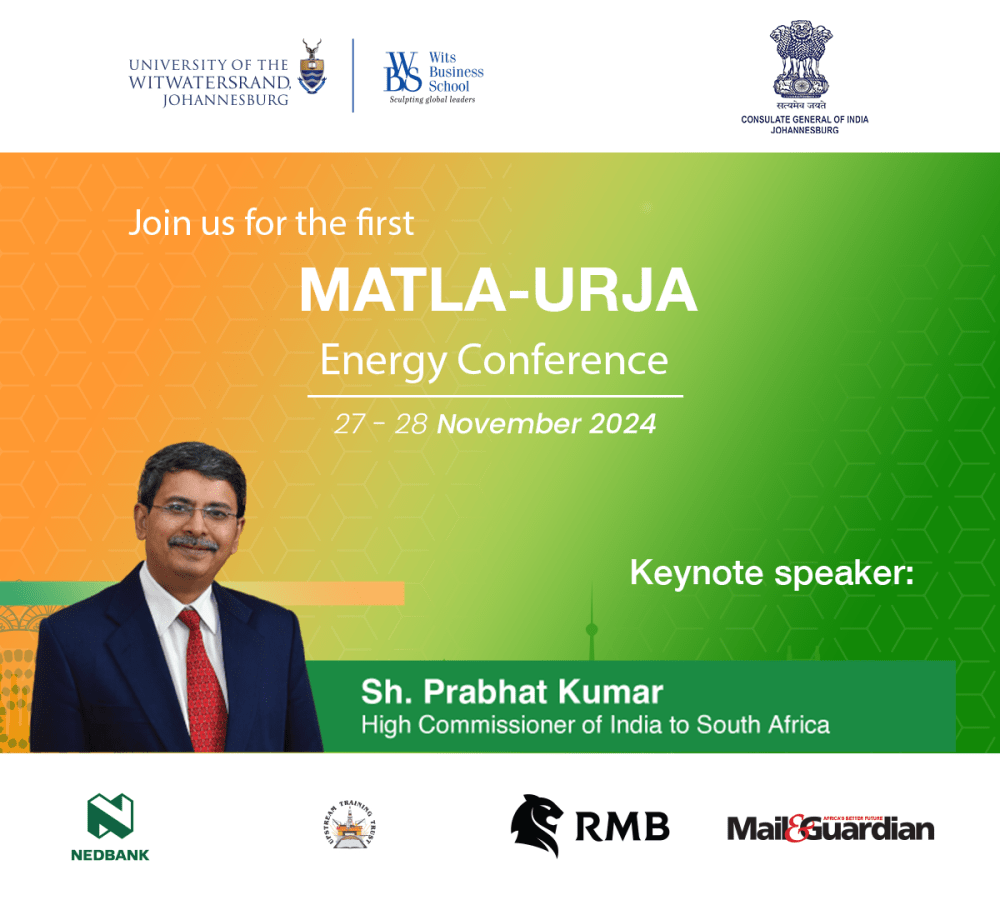Wits Business School (WBS) has partnered with the Consulate General of India, Johannesburg to present a first-of-its-kind conference on energy.
The two-day conference, dubbed Matla-Urja (meaning “power” in Sesotho and Hindi) will take place at WBS on 27 and 28 November and will bring together industry leaders and academics from South Africa and India to engage on both shared energy challenges, global trends, the Just Energy Transition, as well as explore mutual investment opportunities.
The speaker line-up includes the Minister of Electricity and Energy, Dr Kgosientsho Ramokgopa and his counterpart in India, the Minister of Power Sh. Manohar lal Khattar. Other speakers include the Chairperson of the National Transmission Company of South Africa (NTCSA) Ms Priscillah Mabelane, and the High Commissioner of India to South Africa, Sh. Prabhat Kumar.
Shared challenges
India is the third largest energy consumer globally and has emerged as a global leader in the energy transition. The country has created a power surplus and has turned around its entire energy supply chain in order to meet its goal of providing secure and sustainable energy to its vast citizenship.
India, however, still faces many challenges in its transition to a clean energy future. These include financing the transition, a lack of a stable policy framework, a lack of a robust renewable manufacturing industry, and social and environmental concerns arising from rapid renewable energy growth.
For South Africa, the challenge of providing affordable, secure and clean energy for its citizens in ways that simultaneously combat poverty, unemployment and inequality remains one of its most pressing challenges. In the context of a near collapse of its national grid resulting in rolling black-outs, South Africa’s goal is to ensure security of electricity supply while pursuing a diversified energy mix.
With the shared challenge of transitioning to a low-carbon economy while addressing critical socio-economic and environmental issues, South Africa and India can benefit from the sharing of best practice, research and experience, as well as finding areas of common interest for future collaboration and investment.

The Just Energy Transition
The inaugural Matla-Urja Energy Conference kicks off with the academic conference on 27 November, which will include panel discussions on the envisaged role of oil and gas in the Just Energy Transition, trends in Energy Modelling, and skills and capacity development.
Ms Unathi Magida, Stakeholder Relations executive at the Petroleum Agency of South Africa (PASA) will provide an overview of the Upstream Training Trust (UTT), one of the sponsors of the conference, and Mr Ebbe Hahn, who brings with him extensive global experience as an independent Oil and Gas executive, will provide the opening keynote to the academic conference.
Future innovations
The main conference on 28 November will focus on three main technical areas:
- Efficient Energy Systems – the future energy mix and energy efficiency initiatives, with speakers from Eskom and Sasol, as well as NTPC, one of India’s leading power generation companies.
- The Future of Energy Infrastructure, which will look at new horizons in transmission technology, South Africa’s metering systems, energy innovations, and leadership training.
- Energy Financing, which will include speakers from Nedbank, RMB and the African Development Bank, as well as the Power Finance Corporation of India Limited and the Indian Renewable Energy Development Agency (IREDA).
Two exciting memoranda of understanding (MOUs) between South Africa and India will be announced at the conference, which will conclude with a special gala dinner and site visits to Eskom and Sasol.
Addressing the energy skills gap
Since Wits Business School established its African Energy Leadership Centre (AELC) in 2017, the school has positioned itself as a thought leader in energy in South Africa. The AELC, with funding from the Chemical Industries Education and Training Authority (CHIETA) was formed to address the persistent energy challenges in Africa, with a particular focus on addressing the leadership skills deficit in the sector.
Under veteran energy expert Prof Rod Crompton’s direction, WBS developed the first postgraduate programmes of their kind in Africa: a Master’s degree and a postgraduate diploma in energy leadership. Since their launch in 2019, the programmes have attracted a growing number of students who wish to play a leadership role in the changing energy landscape.
The AELC has also established itself as a hub of high impact research and thought leadership, forming strategic partnerships with industry players locally and globally, and hosting regular public debates, masterclasses and dialogues. The AELC has also enrolled a cohort of Doctoral Students as well as Postdoctoral Fellows focusing on energy and related fields. Research focus areas include but are not limited to Energy and the attainment of other SGD’s such as Zero Hunger, Good Health and Well Being, Water and Sanitation, Climate Action; Energy, Technology Innovation and Competitiveness as well as Just Energy Transition and Societal Impact.
In September 2024 Dr David Phaho, formerly the Deputy-Vice Chancellor: Research, Technology Innovation and Partnerships at the Cape Peninsula University of Technology (CPUT) took the helm as Director of the AELC.
For more information on the conference: https://www.wbs.ac.za/matla-urja-energy-conference
Register here